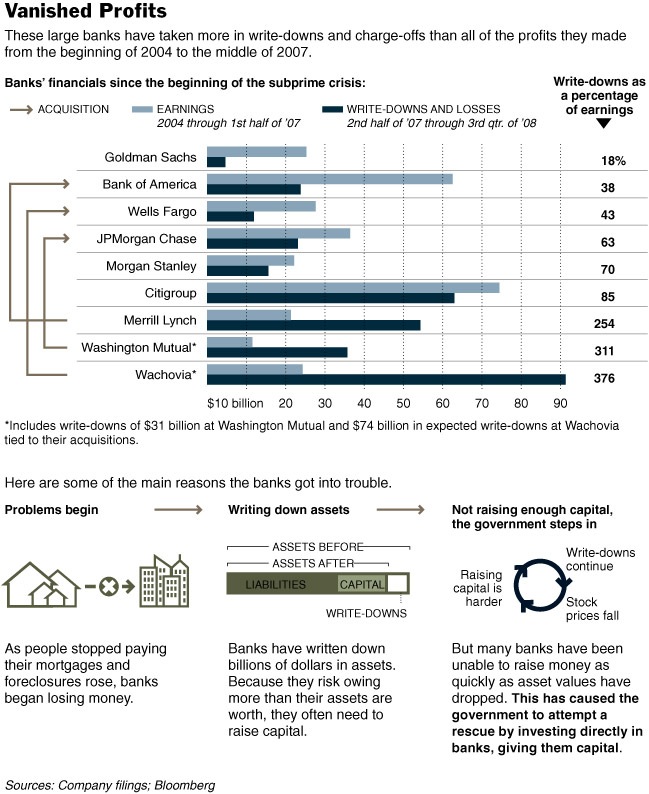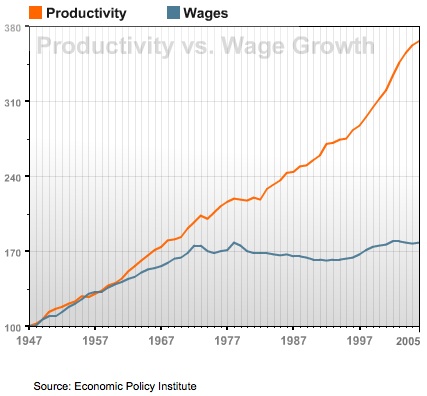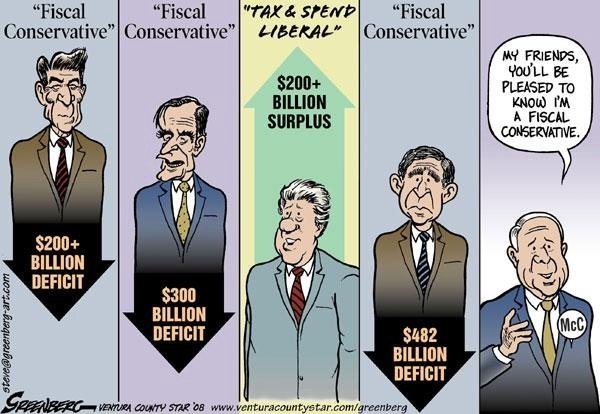
Showing posts with label financial crisis. Show all posts
Showing posts with label financial crisis. Show all posts
Friday, November 28, 2008
Tuesday, November 25, 2008
Old Solutions to a new crisis
Sorry for the lack of updates recently. Been busy with the whole fall of global capitalism thingy. For some glimpses at what we've been up to check here and here.
Recent developments are almost too overwhelming to even comment about. A couple of scattered thoughts:
1) The IMF needs to go. A new loan to Pakistan was approved today, and loans to Hungary and Ukraine have already gone through. The IMF is using this crisis to salvage its reputation and its balance sheet, when it is the institution that created the preconditions for the crisis in the first place. Here's a more detailed article that Sameer wrote on this subject.
2) Let's hope Obama's policies are more visionary than his choices for important economic advisors. Democracy Now had a good panel on this this morning. Basically, almost all of Obama's economic team are former Clinton-era officials who are as responsible for the current situation as anyone. Well anyone except Alan Greenspan, who's in a category of his own. The New York Times, which is normally pretty bad on all this, has a great editorial explaining the culpability of Geithner, Summers, Rubin and all the rest. Nate Silver, who proved himself to be a brilliant pollster this election cycle, has an article arguing that we shouldn't be too quick to judge Obama by his cabinet, as most of the decisions will be coming from the top down. Somehow I don't find that thought comforting, though the chart of policies Nate prepared for that article is helpful.
In general we need to push Obama and his team towards a new kind of economic policy, one that will set up institutions that are more transparent, more accountable and more democratic than what we have now. Ultimately the system should be one that prioritizes human need and basic human rights over the "right" to unlimited profit. This crisis presents all of us who would work for change the opportunity to make those changes real. The opportunity won't come again in most of our lifetimes (the last time was in the 1930s and 40s), so we'd better make the most of it for ourselves and for the next generation.
Recent developments are almost too overwhelming to even comment about. A couple of scattered thoughts:
1) The IMF needs to go. A new loan to Pakistan was approved today, and loans to Hungary and Ukraine have already gone through. The IMF is using this crisis to salvage its reputation and its balance sheet, when it is the institution that created the preconditions for the crisis in the first place. Here's a more detailed article that Sameer wrote on this subject.
2) Let's hope Obama's policies are more visionary than his choices for important economic advisors. Democracy Now had a good panel on this this morning. Basically, almost all of Obama's economic team are former Clinton-era officials who are as responsible for the current situation as anyone. Well anyone except Alan Greenspan, who's in a category of his own. The New York Times, which is normally pretty bad on all this, has a great editorial explaining the culpability of Geithner, Summers, Rubin and all the rest. Nate Silver, who proved himself to be a brilliant pollster this election cycle, has an article arguing that we shouldn't be too quick to judge Obama by his cabinet, as most of the decisions will be coming from the top down. Somehow I don't find that thought comforting, though the chart of policies Nate prepared for that article is helpful.
In general we need to push Obama and his team towards a new kind of economic policy, one that will set up institutions that are more transparent, more accountable and more democratic than what we have now. Ultimately the system should be one that prioritizes human need and basic human rights over the "right" to unlimited profit. This crisis presents all of us who would work for change the opportunity to make those changes real. The opportunity won't come again in most of our lifetimes (the last time was in the 1930s and 40s), so we'd better make the most of it for ourselves and for the next generation.
Thursday, October 30, 2008
Christians Worship Golden Calf
Geez, I don't know how to satirize this. Evangelicals really don't read the Bible, do they?
Courtesy wonkette:

Courtesy wonkette:

Did you know that some Christian dingbat has dubbed today the “Day of Prayer for the World’s Economies?” Well here they are, at the Wall Street bull statue thing, praying to Jesus for money. The dingbat has explained, “We are going to intercede at the site of the statue of the bull on Wall Street to ask God to begin a shift from the bull and bear markets to what we feel will be the ‘Lion’s Market,’ or God’s control over the economic systems.”
Monday, October 20, 2008
Friedman v. Keynes Part I: "How Dare They Expect Us Not to be Greedy - I mean that's the point right?"
Today's news that Ben Bernanke is now advocating serious government spending in order to help stay the huge downturn in the markets should not surprise anyone. Those who have studied economic history will know that "pure" capitalism has really only been tried once or twice - often with disastrous results.
When I heard that Lehman and AIG were going under (or being nationalized in the case of AIG) I knew that the era of Milton Friedman was at an end. Unregulated markets designed to maximize short-term profit above all else always collapse under their own weight. As a friend at one of the last remaining investment banks so eloquently put it, "It's the government's own damn fault anyway for not expecting the free market to be greedy - I mean, that's the point, right?"
But unchecked greed will get even the greedy into trouble. As this graph shows, it wasn't in the interest of these bankers to effectively lose as much money as they've gained since 2004.
(We should all be outraged that a few CEOs and managers have been rewarded to the tune of millions of dollars for losing as much money as they made. Bailout using tax payer dollars while not going after these ill-gotten gains is effectively a subsidy from the poor to the rich. But I digress.)
After the demise of the current system, we're back where we were circa 1960, i.e. Keynesian economics. John Maynard Keynes was a well-regarded economist who developed much of what we now know as the discipline of economics, including the entire discipline of macroeconomics. Keynesian economics argues that the state can play a role - sometimes a major role - in building up the private sector and in stimulating economic growth.
After the depression, World War II and the Bretton Woods Conference (for more on that check out this brilliant essay) Keynesian economics ruled the day, heralding a period of relative growth and prosperity in the United States and around the world. (The success of anti-colonial movements in Africa and Asia no doubt had something to do with these growth rates as well.) As the world switched (with the help of organizations like the International Monetary Fund) to Friedmanism in the 1980s, the effects were disastrous even in terms of economic indicators like growth rates and wages - let alone poverty indicators such as deaths by hunger and preventable disease.

But the system did work well for a few. While worries about inflation were effectively used to undermine wage growth, CEO salaries were allowed to skyrocket. Cutting taxes on capital gains and other kinds of income gave us one of the most regressive tax systems in the world, meaning you tax poor people at higher rates than you tax rich people. A government survey that came out in August showed that most corporations - including very large and profitable corporations - effectively pay no taxes at all.
What brought the system down was not public anger at the injustice of it all, it was that the system could not self regulate even in its own interest. The shock has been so bad that it's there's no chance of reestablishing that regulation - rather we must go back to an explicitly state-driven (as opposed to merely a state-regulated) form of capitalism.
Today's news confirms that Friedmanism is dead both in the U.S. and around the world, and that there's no going back. The obvious question remains: Is that a good thing for those of us who care about ending the violence of poverty and establishing a more just and democratic economic system where human need is prioritized over corporate greed?
When I heard that Lehman and AIG were going under (or being nationalized in the case of AIG) I knew that the era of Milton Friedman was at an end. Unregulated markets designed to maximize short-term profit above all else always collapse under their own weight. As a friend at one of the last remaining investment banks so eloquently put it, "It's the government's own damn fault anyway for not expecting the free market to be greedy - I mean, that's the point, right?"
But unchecked greed will get even the greedy into trouble. As this graph shows, it wasn't in the interest of these bankers to effectively lose as much money as they've gained since 2004.

(We should all be outraged that a few CEOs and managers have been rewarded to the tune of millions of dollars for losing as much money as they made. Bailout using tax payer dollars while not going after these ill-gotten gains is effectively a subsidy from the poor to the rich. But I digress.)
After the demise of the current system, we're back where we were circa 1960, i.e. Keynesian economics. John Maynard Keynes was a well-regarded economist who developed much of what we now know as the discipline of economics, including the entire discipline of macroeconomics. Keynesian economics argues that the state can play a role - sometimes a major role - in building up the private sector and in stimulating economic growth.
After the depression, World War II and the Bretton Woods Conference (for more on that check out this brilliant essay) Keynesian economics ruled the day, heralding a period of relative growth and prosperity in the United States and around the world. (The success of anti-colonial movements in Africa and Asia no doubt had something to do with these growth rates as well.) As the world switched (with the help of organizations like the International Monetary Fund) to Friedmanism in the 1980s, the effects were disastrous even in terms of economic indicators like growth rates and wages - let alone poverty indicators such as deaths by hunger and preventable disease.

But the system did work well for a few. While worries about inflation were effectively used to undermine wage growth, CEO salaries were allowed to skyrocket. Cutting taxes on capital gains and other kinds of income gave us one of the most regressive tax systems in the world, meaning you tax poor people at higher rates than you tax rich people. A government survey that came out in August showed that most corporations - including very large and profitable corporations - effectively pay no taxes at all.
What brought the system down was not public anger at the injustice of it all, it was that the system could not self regulate even in its own interest. The shock has been so bad that it's there's no chance of reestablishing that regulation - rather we must go back to an explicitly state-driven (as opposed to merely a state-regulated) form of capitalism.
Today's news confirms that Friedmanism is dead both in the U.S. and around the world, and that there's no going back. The obvious question remains: Is that a good thing for those of us who care about ending the violence of poverty and establishing a more just and democratic economic system where human need is prioritized over corporate greed?
Thursday, October 16, 2008
This election is over
Need I say more?
Well maybe I don't need to but I will. In addition to dramatically defeating McCain, we residents of the USA need to abolish two of his (and Bush's) failed ideologies - neoconservativism (or just plain colonialism for those of us in the reality based community) and neoliberalism (or market fundamentalism). Sameer's article at FPIF has all the details.
Friday, October 10, 2008
sorry for the short lapse in posting
things have been pretty crazy with the whole fall of global capitalism and all. In the next few days look for thoughts on whether or not capitalism should rise again, or whether we should start looking for alternatives (no points for guessing which of those we prefer). One "middle road" that I've heard tossed around a lot would be a return to Keynesian economics and the Bretton Woods system. Well, it would certainly be better than what we've got at the moment.
But in the meanwhile, I'm just in awe of John McCain. The entire economic system is crashing around us and all he can do is throw stones at his opponent. Well, pebbles. Or those bits of bark that sort of look like rocks, but then you pick them up and they're not really.
I can't think of anything remotely serious to say in the face of McCain/Palin pandering to their racist base while trying to divert attention from the economic meltdown. So I'll let Betty White tell some jokes.
But in the meanwhile, I'm just in awe of John McCain. The entire economic system is crashing around us and all he can do is throw stones at his opponent. Well, pebbles. Or those bits of bark that sort of look like rocks, but then you pick them up and they're not really.
I can't think of anything remotely serious to say in the face of McCain/Palin pandering to their racist base while trying to divert attention from the economic meltdown. So I'll let Betty White tell some jokes.
Monday, September 15, 2008
On today's further unraveling of the mortgage bubble
I share with you a quote and a cartoon. First the cartoon:

I really don't get how the Republican party can claim to be the party of fiscal responsibility and no one calls them on it. Especially with a $7.7 trillion war going on.
And the quote:
Modern industrial civilization has developed within a certain system of convenient myths. The driving force of our industrial civilization has been individual material gain, which is accepted as legitimate, even praiseworthy on the grounds that private vices yield public benefits, in the classic formulation. Now it's long been understood, very well, that a society that is based on this principle will destroy itself in time. It can only persist with whatever suffering and injustice it entails, as long as it's possible to pretend that the destructive forces that humans create are limited, that the world is an infinite resource, and that the world is an infinite garbage can.
At this stage of history, either one of two things is possible: either the general population will take control of its own destiny and will concern itself with community interests, guided by values of solidarity, and sympathy and concern for others; or alternatively, there will be no destiny for anyone to control.
-Noam Chomsky from Manufacturing Consent
I think the entire financial industry as its been built up over time and especially since about 1990 when we've had these huge speculative bubbles is a way for us to avoid facing the music: if we continue to prioritize private profit over public goods, we will be destroying ourselves as a species.

I really don't get how the Republican party can claim to be the party of fiscal responsibility and no one calls them on it. Especially with a $7.7 trillion war going on.
And the quote:
Modern industrial civilization has developed within a certain system of convenient myths. The driving force of our industrial civilization has been individual material gain, which is accepted as legitimate, even praiseworthy on the grounds that private vices yield public benefits, in the classic formulation. Now it's long been understood, very well, that a society that is based on this principle will destroy itself in time. It can only persist with whatever suffering and injustice it entails, as long as it's possible to pretend that the destructive forces that humans create are limited, that the world is an infinite resource, and that the world is an infinite garbage can.
At this stage of history, either one of two things is possible: either the general population will take control of its own destiny and will concern itself with community interests, guided by values of solidarity, and sympathy and concern for others; or alternatively, there will be no destiny for anyone to control.
-Noam Chomsky from Manufacturing Consent
I think the entire financial industry as its been built up over time and especially since about 1990 when we've had these huge speculative bubbles is a way for us to avoid facing the music: if we continue to prioritize private profit over public goods, we will be destroying ourselves as a species.
Subscribe to:
Posts (Atom)
